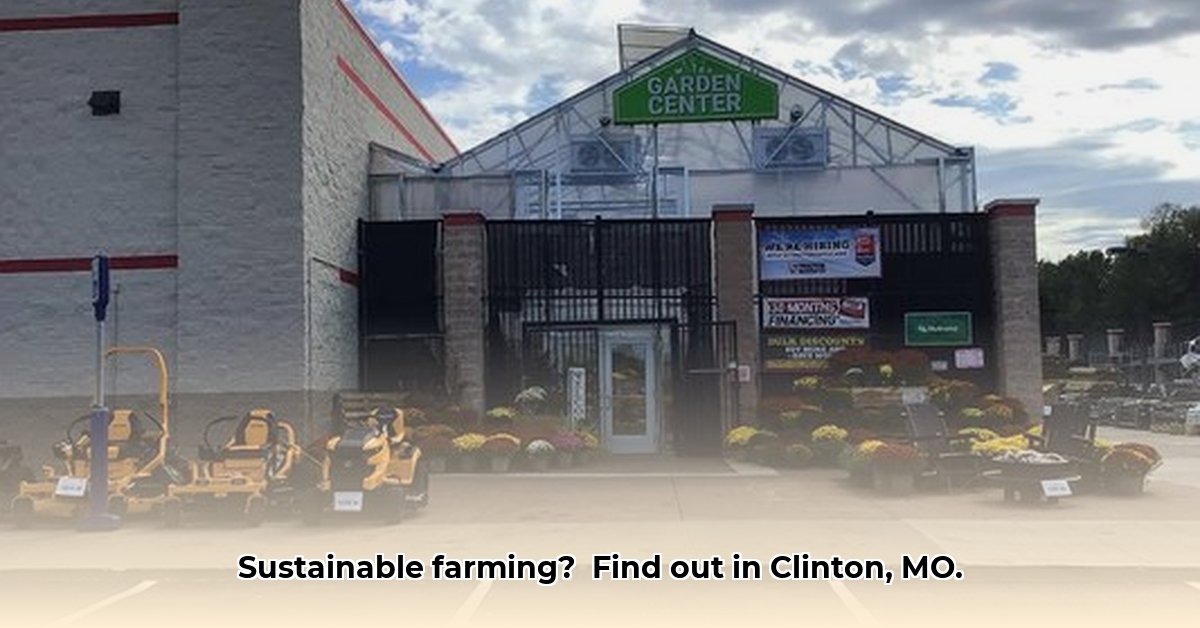
Assessing Tractor Supply's Role in Clinton, MO Sustainable Agriculture
This article analyzes the potential contribution of the Clinton, MO Tractor Supply store to the region's sustainable agriculture efforts. While Tractor Supply's presence suggests a potential role, a comprehensive assessment requires more data. For information on liquid fertilizers, see this helpful resource. This analysis highlights the existing information gaps and proposes actionable steps for farmers, Tractor Supply management, and local government to promote sustainable farming practices. Key areas of investigation include the availability of organic seeds, water-efficient irrigation systems, and environmentally friendly pest control solutions.
Unpacking the Potential: Current Knowledge and Missing Data
Tractor Supply's strategic location near major roads and the Henry County Fairgrounds indicates its proximity to a significant agricultural community. However, a lack of publicly available data prevents a definitive assessment of its contribution to sustainable agriculture. Crucial information—regarding product offerings, sales figures for sustainable products, and comparison with competitor offerings—is currently unavailable. This limits the ability to quantify Tractor Supply's current impact. Do they indeed stock the essential tools needed to cultivate a truly sustainable farm, including organic seed options and water-saving irrigation technology? This is a critical question demanding further investigation.
The Need for Comprehensive Data
To accurately evaluate Tractor Supply's role, a more thorough investigation is necessary. This involves:
Sales Data Analysis: Analyzing sales figures for organic seeds, biofertilizers, and water-efficient irrigation systems would quantify the store's actual contribution to sustainable practices. Such data would provide concrete evidence of their impact on the local farming community.
Comparative Market Analysis: A comparative study of Tractor Supply's product offerings with those of other local agricultural suppliers would reveal its competitive position within the sustainable agriculture market.
Local Agricultural Reports: Integrating information from local agricultural reports on the trends and adoption rates of sustainable farming methods would contextualize Tractor Supply's role within the broader agricultural landscape of Clinton, MO. This would highlight any current gaps or unmet needs.
These data points will provide a much more nuanced understanding of its impact than is currently possible.
Collaborative Action: A Multi-Stakeholder Approach
Several stakeholders can contribute to fostering sustainable agriculture in Clinton, MO:
| Stakeholder | Short-Term Actions | Long-Term Actions |
|---|---|---|
| Local Farmers | Directly engage with Tractor Supply staff, expressing needs. Explore existing product offerings. | Advocate for expanded sustainable product lines. Form farmer networks to collectively influence supply choices. |
| Tractor Supply | Conduct market research to assess local demand for sustainable products. | Adjust product offerings based on market research. Establish partnerships with local agricultural organizations for product guidance. |
| Local Government | Fund educational workshops on sustainable farming techniques. Offer incentives for adopting sustainable practices. | Invest in infrastructure (e.g., improved irrigation systems) supportive of sustainable farming. |
Actionable Steps: Building a Sustainable Future
Building a sustainable agricultural future in Clinton requires collaborative efforts:
Farmer Engagement: Farmers should actively engage with Tractor Supply: request specific sustainable products, and provide feedback on product offerings and suggestions.
Market Research by Tractor Supply: The company should conduct thorough market research to identify unmet needs and tailor its product range accordingly.
Public-Private Partnerships: Local government should partner with Tractor Supply and local farmers to fund educational initiatives, provide incentives, and improve supporting infrastructure.
Ongoing Monitoring & Evaluation: Regular monitoring and data collection are vital to measure the progress of these sustainability initiatives and guide future actions. This continuous feedback loop allows adaptive strategies, optimizing the effectiveness of the process.
Exploring Alternative Suppliers: Farmers should diversify their sourcing, exploring smaller local businesses and cooperatives that specialize in sustainable products and might offer more personalized service.
Conclusion: While Tractor Supply holds potential to support sustainable agriculture in Clinton, MO, its actual contribution remains unclear due to limited data. This analysis underscores the need for a collaborative, data-driven approach involving farmers, the retailer, and local government to foster a more environmentally responsible agricultural sector in the region. Further research is essential to fully understand and maximize Tractor Supply's impact.